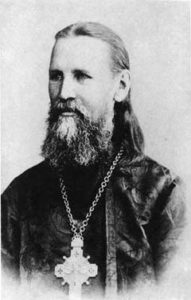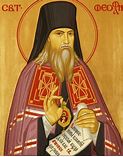SSCORRE!
Saint Sophia Cathedral
Online Resources for our Religious Edification

TOPIC OF THE WEEK:
Who was he? How are Saints considered for canonization?
-
“Today more than ever we need to bring to the surface the bright example of these saintly contemporary fathers and their God-Inspired Traditional Orthodox teachings to help us understand that holiness is attainable; purification, illumination and theosis are attainable even in these dark ages of materialism, atheism and secularism.” http://www.
saintnicodemospublications. com/about.php
Adult/Family:
Read all about his life
- “His concern and great love for the flock that God had entrusted to him was exceptional: his aim was to make his Metropolis part of the Kingdom of God…. What establishes the Metropolitan Kallinikos as truly a man of God and reveals his wealth of virtues, however, is the way in which he faced the various difficulties in his life and his illness. Although he sacrificed himself wholly for his flock every day, suffered unjust and slanderous attacks, he faced these and his illness without murmuring or self-pity, without complaints or objections, but with faith in God and great patience, having abandoned himself to God’s providence. His self-condemnation was incomprehensible to worldly reasoning. On many occasions in his life he had the gift of remaining silent. Watchfulness and the remembrance of death, which were particularly evident during the period of his illness, distinguished him throughout his life. His gratitude was boundless: he was infinitely grateful, and he thanked and praised God for everything.”
Read about the process of canonization
- “This is the official procedure which varies a little from Church to Church and it is very good that we have it. However, we must not forget that the core is our veneration, and that the greatest saints were not subjected to this procedure, which was instituted simply in order to avoid misplaced enthusiasm.”
- Click here to read about the Preconditions for Canonization
Preschool: – All About Saints; Canonization of Saints
Does the Orthodox Church “make” a Saint? No. Only God can do that. The Church merely recognizes that such a person has cooperated with God’s Grace to the extent that his or her holiness is beyond doubt.
Are Orthodox Saints “elected”? Again, no. In order to avoid misunderstandings, the Ecumenical Patriarchate only issues special encyclical letters in which the Holy Synod, after taking into consideration thousands of official and signed letters of faithful people, who have experienced the holiness and miracles of a particular man or woman firsthand, accepts the popular feelings about a Saint.
- Long before any official steps are taken, a person considered saintly is venerated by the people where he or she lived and died.
- Then a request is made, usually through the diocesan bishop, for the Church to recognize that person as a Saint.
- A committee is assigned to research the life and the certified miracles of the person and to submit a reportto the Holy Eparcial Synod of the Ecumenical Patriarchate.
- Then the Holy Synod decides to number that person among the Saints.
- The other Orthodox Churches are notified so that they can include the new Saint in their calendars.
Since the early Christian period, many descriptions of the lives, martyrdoms and miracles of the Saints have been preserved. These are called synaxaria (from the Greek word Synaxis, a gathering in the Church for liturgical purposes, where the lives of the Saints were read.)
Elementary/Middle School: New Saint: Metropolitan Kallinikos of Edessa (1918-1984) Canonized By Constantinople
- “… worked zealously and tirelessly to properly prepare the clergy under his care….
- set up a boarding school… and a nursing home… promoted monasticismin his diocese and reconstituted the first monastery…
- subjected to unjust and defamatory attacks despite his virtue and integrity….
- treated those who attacked him with meekness and love….
- ascetic bishop, full of missionary, self-sacrificing zeal….
- speech was deeply theological and spiritually invigorating….
- suffered a 7-month illness, which he faced boldly, placing his fate in God’s hand….
- gave his soul to the Lord on August 8, 1984…
- funeral attended by 29 hierarchs, numerous clergy, and a large number of the faithful…
- buried in the Edessa Public Cemetery at his own request… to be close to the people he served and loved
- hierarchs, clergy, and laity continued to feel his presence as though he were alive, and many testified to miraculous healings and the expulsion of demons by his prayers.“
- THROUGH THE PRAYERS OF ST. KALLINIKOS, LORD JESUS CHRIST OUR GOD, HAVE MERCY ON US AND SAVE US! AMEN!
High School:
Read the Preconditions for Canonization, an interview with Metropolitan Hierotheos of Nafpaktos and Agiou Vlasiou.
- “…A saint is not a good person or even a virtuous person, but someone who exists within the Church with its sacramental and evangelical life, united with Christ, and they feel within them the Grace of Christ….the Ecumenical Patriarchate is not “making a saint”, but “enlisting a saint”….Each era has its saints…. the truth is that there are many people who exist that can be characterized as saints, who may not be openly manifest. This means that despite our many problems today, we should not despair.”
A Message from Maria Spanos
I am passionate about our Orthodox Christian faith and seek to help others learn as much as they can about it. My purpose here is to share online resources that help strengthen our relationship with Christ and bind us closer to His Church. I believe they are invaluable in learning about our precious Orthodox Tradition, and are a great aid for teaching family members, friends and others about Orthodoxy. ~Maria
Two of my favorite quotes:
 “A true Christian behaves in this life so that it may be a preparation for the future one and not only a life here below. In his actions, he does not think what will be said of him here but of what will be said there in heaven; he represents to himself that he is always in the presence of God, of the angels and all the saints, and remembers that someday they will bear witness of his thoughts, words, and deeds.” — Saint John of Kronstadt
“A true Christian behaves in this life so that it may be a preparation for the future one and not only a life here below. In his actions, he does not think what will be said of him here but of what will be said there in heaven; he represents to himself that he is always in the presence of God, of the angels and all the saints, and remembers that someday they will bear witness of his thoughts, words, and deeds.” — Saint John of Kronstadt
__________________________________________________________

“Of all the holy works, the education of children is the most holy.”
— St. Theophan the Recluse







